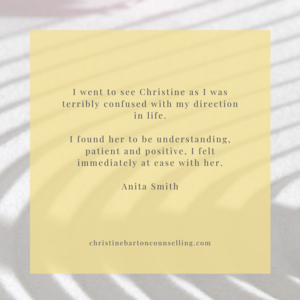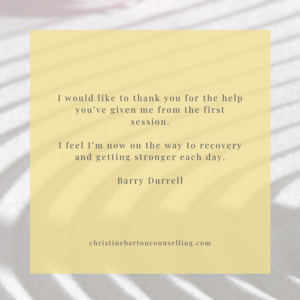Depression
Living with depression can be a very painful and distressing place to be. Depression can take over and leave people feeling both physically and emotionally drained. People often feel very alone and isolated, and as though no one fully understands what they are going through. Therapy helps to provide people with a space where they are heard and supported through a very dark place and painful time. It also helps people to gradually re-build and put their lives back together.
Everyone has ups and down. Sometimes you might feel a bit low, for lots of different reasons. People may say that they are feeling depressed when they are feeling down, but this does not always mean that they have depression.
Depression is a long lasting low mood disorder. It affects, your ability to do everyday things, feel pleasure or take interest in activities.
Low Self-Esteem & Confidence
People often come for therapy because they have very low self worth. This means that they lack confidence and that their self-esteem is very fragile. This can often be the result of their past experiences, either growing up, or in a relationship. It may be the result of bullying or abuse for example. Therapy can really help people to start to believe in themselves again and to recognise what they have to offer, and the positive aspects of themselves, it can assist people in developing and moving forward.
Facing a life-threatening diagnosis
Being diagnosed with a life-threatening or terminal illness is likely to trigger feelings of fear and grief. More than ever, its important to surround yourself with positive and supportive people. Try to find small things that you can enjoy every day, and set realistic short-term goals for yourself. Even small goals such as a visit to the shops, and a meeting up with a close friend, can help you make the most of each day and help you feel you're still a person.
Illness can be stressful on the entire family, it's not unusual for couples to experience strain on their relationship. The victim can become so involved in their illness, their feelings, their issues, that they are facing that the partner can feel rejected. It's important to understand that the partner is also scared, confused and lives with the fear of losing the one person they love.
If you have children, plan for time with your partner, also encourage your partner to make time to care for herself or himself. You may feel you're on a roller coaster of emotion - accepting one day, and angry the next. It may help to remind yourself that these feelings are normal., and will likely ease with time.
Bereavement & Loss
Whether a bereavement is sudden or expected, it is highly distressing and traumatic. People feel under great stress and strain when someone they love dies, and no matter what the circumstances, grief can include a wide range of emotions from sadness to anger. Loss can also be the loss of a relationship after a marriage breakdown for example, or the loss of an animal, a home, a job etc. it is not only bereavement that can leave people feeling empty and alone. Therapy can really help people as they go through the stages of grief and ensure that they have the support that they need as they work through all the different emotions involved.
Stress (money, health, relationships, work)
Stress plays a massive role in a lot of people's lives. Sometimes work, relationships, money and/or health concerns can cause people to feel under a lot of pressure. Signs of being stressed are feeling overwhelmed, run down, irritability, inability to sleep and sometimes eating can be effected (either over or under eating). Stress can often lead to physical health problems and emotional outbursts. Stress is really hard to live with, and therapy can offer an outlet for this, and a place where you can discuss and work through the factors that are causing you to feel so stressed-out.
TRAUMA (experiencing/witnessing accidents, attacks, abuse, violence, wars, natural disasters, etc.)
As a result of either experiencing or witnessing a traumatic event an individual can be left questioning their beliefs and with their trust destroyed. They can feel overwhelmed and the emotions may be confusing and hard to understand. They may experience flashbacks, upsetting memories, nightmares and insomnia. People can often feel emotionally detached from what has happened and find themselves re-experiencing the event over and over again. The result of this can either be depression, low self-esteem, anger, stress, anxiety or even panic attacks. Some people may also develop addictive patterns as a way of coping. Therapy can help people to cope with traumatic experiences and help them to understand what they have gone through. It can also assist them in dealing with the symptoms that they may have developed.
ADOPTION (Adopting, tracing or reuniting - adopted, birth/adoptive family member)
Whether you are considering adopting, tracing or reuniting, you are adopted yourself or a birth/adoptive family member, I am able to offer you support. The most important thing to note is that your counsellor needs to be able to relate to your situation with an understanding of the adoption process whether that is current or in the past. The issues of loss, rejection and attachment are just some of the things that you may be carrying due to what you have been through. The era of the adoption will make a difference to your circumstances and your counsellor needs to have an awareness of this.
RELATIONSHIPS (Separation & Divorce)
Sometimes, when there's nothing else for it, marriages and relationships end in divorce or separation and couples have to go their separate ways. If you have children, it's important that your break-up goes as smoothly as possible to have as little impact on them as you can manage. Even if there aren't children involved, any relationship break down can affect all other areas of your life. Separation is a time of big change and many decisions must be made. It can help if decisions are taken calmly, without aggressive outbursts and negative arguments.
Loneliness is a frightening prospect, and one that can cause irrational behaviour, but staying in an unfulfilling relationship because you're frightened of being alone is a relatively common situation, and one that many people come to.
Issues
Addictions
Alcohol Use
Anger Management
Bereavement
Chronic illness
Coping Skills
Depression
Divorce
Domestic Abuse
Domestic Violence
Drug Abuse
Eating Disorders
Family issues
Narcissistic Personality
Obsessive Compulsive Disorder (OCD)
Parenting
Relationship Issues
Self Esteem
Self-Harming
Sexuality
Sexual Abuse
Stress
Areas of Therapy
There are many great ways of practising counselling & psychotherapy and this can make it confusing to know which to choose from.
Research suggests that the relationship between the client and therapist itself is more important for a good outcome than the particular theories the therapist favours. This means that if I succeed in helping you to feel safe, accepted and treated with respect and perhaps challenge you in a positive constructive way, you are likely to be able to make good use of your sessions.
Different approaches to counselling have different ideas about human development, where psychological problems come from and the best way to use 'talking therapy' to help. Some counsellors, for example, will encourage you to take the lead in what is discussed and to support you in realising that you are actually more capable and resourceful than you may feel. Others may be more 'directive' and will teach you ways of changing your beliefs and behaviour by, for example giving you 'homework' exercises.
It can nevertheless be useful to have some understanding of the wide range of approaches that therapists may have been trained in and will use in deciding how to work with you. You may find one approach more appealing than another or find that some approaches are more suited to your particular needs than others.
Cognitive Behavioural Therapy (CBT)
Family / Marital
Hypnotherapy
Integrative
Person-Centred
Positive Psychology
Psychodynamic
Trauma Focused








